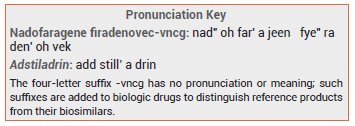ONLY
ARTICLE
Nadofaragene firadenovec-vncg (Adstiladrin – Ferring), an adenoviral vector-based gene therapy, has been approved by the FDA for treatment of adults with high-risk Bacillus Calmette-Guérin (BCG)-unresponsive non-muscle invasive bladder cancer (NMIBC) with carcinoma in situ with or without papillary tumors. It is the first adenoviral vector-based gene therapy to be approved in the US for this indication. The immune checkpoint inhibitor pembrolizumab (Keytruda) was approved for the same indication in 2021.

MECHANISM OF ACTION — Nadofaragene firadenovec is a nonreplicating adenoviral vector-based gene therapy that delivers a copy of a gene encoding interferon-alfa 2b to the bladder epithelium, where it has anti-tumor effects. Syn3, a polyamide surfactant excipient, enhances viral transduction of the urothelium.
CLINICAL STUDIES — FDA approval of nadofaragene firadenovec was based on the results of a single-arm trial in 151 patients with high-risk NMIBC, 98 of whom had BCG-unresponsive carcinoma in situ. Patients received nadofaragene firadenovec by intravesical instillation once every three months for up to 12 months unless high-grade recurrence or unacceptable toxicity occurred. A complete response was achieved in about 53% of patients within 3 months after the first dose of the drug and the response was maintained in about 46% of these patients at 12 months. The median duration of response was 9.7 months.1
ADVERSE EFFECTS — The most common adverse effects of nadofaragene firadenovec in the clinical trial were hyperglycemia, instillation-site discharge, increased triglyceride levels, fatigue, bladder spasm, micturition urgency, increased creatinine levels, hematuria, decreased phosphate levels, chills, dysuria, and pyrexia. Because nadofaragene firadenovec contains low levels of replication-competent adenovirus, it may increase the risk of disseminated adenovirus infection in immunocompromised patients.
PREGNANCY AND LACTATION — Nadofaragene firadenovec has not been studied in pregnant women. Women of reproductive potential and their male partners should use effective contraception during treatment and for 6 months (females) or 3 months (males) after the last dose. No data on the presence of the drug in human breast milk or on its effect on the breastfed infant or milk production are available.
DOSAGE, ADMINISTRATION, AND COST — Nadofaragene firadenovec is supplied in cartons containing 4 single-dose vials for intravesical instillation; each vial contains 3 x 1011 viral particles (vp)/mL. The recommended dose is 75 mL instilled into the bladder and left for 1 hour once every three months. Premedication with an anticholinergic drug is recommended before each dose. The wholesale acquisition cost (WAC) for one 75-mL dose of Adstiladrin is $60,000.2
- SA Boorjian et al. Intravesical nadofaragene firadenovec gene therapy for BCG-unresponsive non-muscle-invasive bladder cancer: a single-arm, open-label, repeat-dose clinical trial. Lancet Oncol 2021; 22:107. doi:10.1016/s1470- 2045(20)30540-4
- Approximate WAC or manufacturer's published price to wholesalers; WAC represents a published catalogue or list price and may not represent an actual transactional price. Source: AnalySource® Monthly. November 5, 2024. Reprinted with permission by First Databank, Inc. All rights reserved. ©2024. www.fdbhealth.com/policies/drug-pricing-policy.
